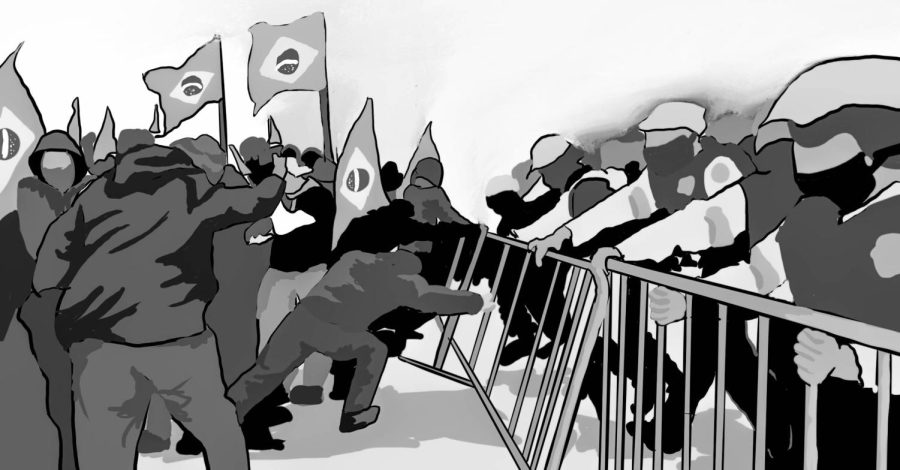The parallels between the U.S. and Brazil’s insurrections
MAYA PHILLIPS ARGUES THAT the Jan. 6 insurrection at the US Capitol set a precedent for future challenges of democracy. She compares Brazilian Candidate Bolsonaro to Donald Trump with their conservatism and predjudice.
February 24, 2023
After violent rioters stormed the U.S. Capitol on Jan. 6, 2021, American and global democracy are in a perilous position. The stakes were incredibly high for Brazil’s presidential election in October 2022. This was a pivotal election globally due to the fragile state of democracy and the wide range of pressing issues Brazil currently faces. The struggle between autocracy and democracy is playing out in Brazil. Brazil’s insurrection and former president, Bolsonaro’s flight to the US, further dramatize the crumbling state of democracy in the US. The US was always a paragon for democracy. However, its moral standing has been tarnished. It is a disappointment that challenges to democracy in the US are going global, inspiring violence and democratic backsliding.
The political unrest in Brazil is reminiscent of the events following the 2020 presidential elections in the US. The candidates, Jair Bolsonaro and Luiz Inácio Lula da Silva, represent two different political extremes.
The left-leaning candidate da Silva was victorious. Jair Bolsonaro is seen by many as a figure that politically resembles Donald Trump. According to the BBC, he has been nicknamed “The Trump of the Tropics.” Trump and Bolsonaro have both built their brands on strong conservative values, while vowing to counteract crime and corruption. They pledge to bring back the more prosperous past to their country’s future. Bolsanaro lost despite his countless efforts to steal the election.
According to the New York Times Bolsonaro is a strong advocate of military dictatorship. He has frequently incited bigoted hatred and discriminated against Black and indigenous people in addition to women and members of the LGBTQ+ community. His opponent President Luiz Inácio Lula da Silva is a former leftist president who served as President of Brazil from 2003- 2011. He champions social welfare programs. During his past presidency, he introduced new programs that brought millions of Brazilian citizens out of poverty.
Lula’s humble background and leftist views appealed to many lower and middle-class citizens, garnering him political support. However, in 2016 Lula was convicted for ataking bribes, accepting favors and money laundering. His house was raided and he was questioned. Within the year, he faced six corruption cases. In 2017, Lula was convicted and was sentenced to 10 years in prison, but he was vindicated, proven innocent, and has since regained power. However, the political divide in Brazil continues to worsen.
On Jan. 9, 2023, just days after the anniversary of the January 6 insurrection, thousands of right-wing Bolsonaro supporters stormed the Congress building, the Presidential Palace, and the Supreme court (all three branches of government). Similar to the US, the rioters refused to accept the outcome of the election. This was a situation that many had Brazilians feared. Security services responded with tear gas and struggled to regain control of the capital. The government computer system was attacked and artworks were vandalized.
These events are a direct ripple effect of America’s insurrection. If one watches the images from both events side by side they have a haunting resemblance. However, Brazil’s insurrection is not just a parallel to what happened in the US. It is made worse by the fact that rioters were not just angry that Bolsonaro lost. They are outraged that Lulu won, because they believe he belongs in prison. It is a shared belief among many right-wing extremists that Lula is a communist who plans to start a communist dictatorship.
The Brazilian police failed to do their job. Although many were aware of the possible attack no preventive measures were taken. Fearing prosecution, Bolsonaro fled to Florida, where he has allegedly found a safe haven with former President Trump.




